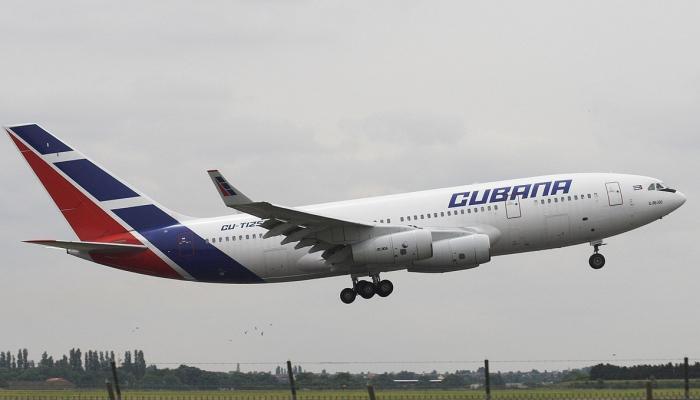Cuba’s flagship airline Cubana de Aviación has announced the cancellation of several of its flights as a result of the latest measures implemented by the U.S. against Cuba. Cubana has given its assurance that steps are being taken to address this situation.
Aircraft leased by Cubana to cover international and national routes have been returned to their countries of origin, prompting the company to cancel flights to Mexico City, Cancun, Santo Domingo, Caracas, Port-au-Prince in Haiti, Fort-de-France in Martinique and to Guadeloupe, and affecting also domestic flights from and to Santiago de Cuba and Holguin provinces.
Arsenio Arocha Elías-Moisés, deputy director of Cubana de Aviación, told the press that this past Monday Cubana was notified of the closing of two aircraft leasing contracts by companies from third countries, arguing that up until December 31st next, an estimated 40,000 passengers will be affected.
Although the official did not reveal the name of the foreign companies that canceled their agreements with the Cuban airline, he said that Cubana de Aviación is looking for alternatives and solutions to continue providing services.
As was duly denounced by Cuba, beginning this past October 21st, the Bureau of Industry and Security of the US Department of Commerce implemented new amendments to the Export Administration Regulations, aimed at further restricting exports and re-exports of goods to Cuba.
In statements to the press here in Havana, Cuba’s deputy minister of transport Naima Alfonso provided a detailed explanation on this latest anti-Cuba maneuver by Washington. She said the new measures seek to further deteriorate US-Cuba ties, by tightening Washington’s nearly sixty year-old blockade policy against its neighboring Caribbean state.
Minister Alfonso said that the latest US measure amounts to an additional lev erage on the neighboring Caribbean state, using as a pretext Havana’s unwavering friendship and solidarity with the Venezuelan people and their constitutional government headed by President Nicolás Maduro.
"The new measures seek to further tighten the US policy of blockade against Cuba. It means that from now on the US government will deny licenses to a group of companies, which used to work with our country, leasing us aircraft and vessels. Beginning October 21st, the Bureau of Industry and Security of the US Department of Commerce has established a general policy of refusal of leases of aircraft and vessels by those companies to our country, thus hampering Cuba’s commercial relations.
"The Bureau of Industry and Security also said that license applications for the export or reexport to Cuba of foreign-made items that include 10 percent or more of US-origin content will be subject to a general policy of denial. Previously, those companies had to apply for a US license if the foreign-made items exported or reexported to the Caribbean state included 20 percent or more of US-origin content. Now the US has further lowered that amount, establishing a general 10-percent de minimis level for Cuba.
"As I said, they are establishing also a general policy of denial for leases of aircraft and vessels to our country, regardless of the US-origin content in those aircraft or vessels, or in the transported goods. By doing this, they are simply seeking to reduce to zero Cuba’s chances to rent aircraft or vessels from any company interested in doing business with us."
The Cuban deputy minister of transport described the situation as complex, but confirmed that, as always, the country will seek alternatives to confront and overcome Washington’s aggression, without yielding to foreign pressures nor renouncing any of the principles upheld by our people and our Revolution.
"Commercially speaking, this new measure puts our nation in a complex situation, but we won’t capitulate nor surrender. On the contrary, we will continue working with those companies that do not yield to pressures from the US government, as we’ve been doing
for the past nearly six decades. We will find alternatives, and we will continue flying the skies and sailing the seas around the world."
The transport sector is one of the hardest hit by Washington’s blockade of Cuba. Between April 2018 and March 2019, damage to the sector caused by the US hostile policy surpassed 170 million dollars – representing 69 million dollars more than the previous year.
The US blockade hampers Cuba’s efforts to purchase aircraft, aviation spare parts and advanced technologies, as Washington’s hostile policy prevents Cuba’s access to major manufacturers and suppliers involving US capital.
Other negative impacts of the US blockade on the Cuban transport sector include the restricted flows of passengers to and from the island and additional costs to the country as a result of the geographical relocation of trade.
Cuban President Miguel Diaz-Canel said that new anti-Cuba measures by the Trump Administration are an expression of impotence, moral degradation, and imperial contempt.
In a post on Twitter, Diaz-Canel described the measures as inhumane, cruel, unjust, and genocidal. He wrote: “We will not surrender, and we will give a sovereign response.”


